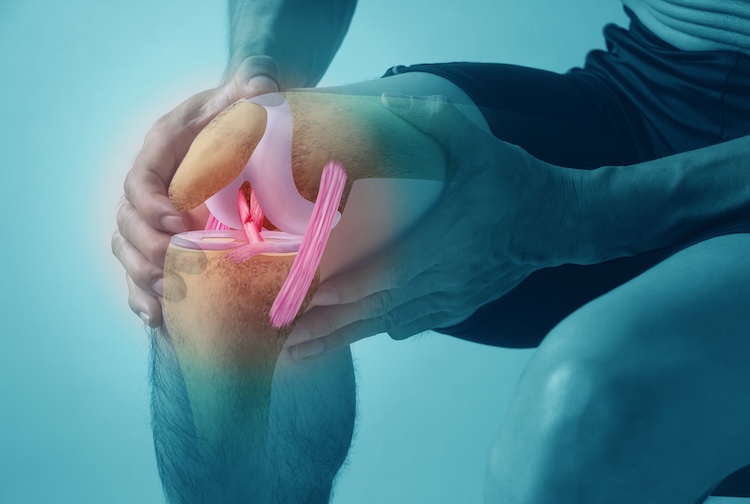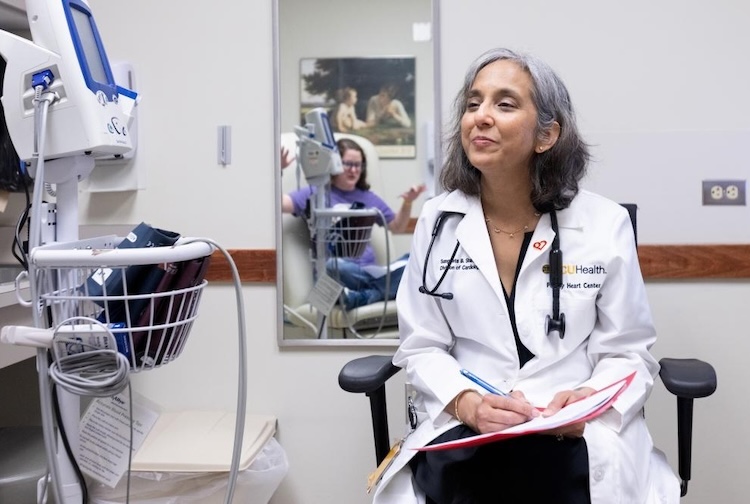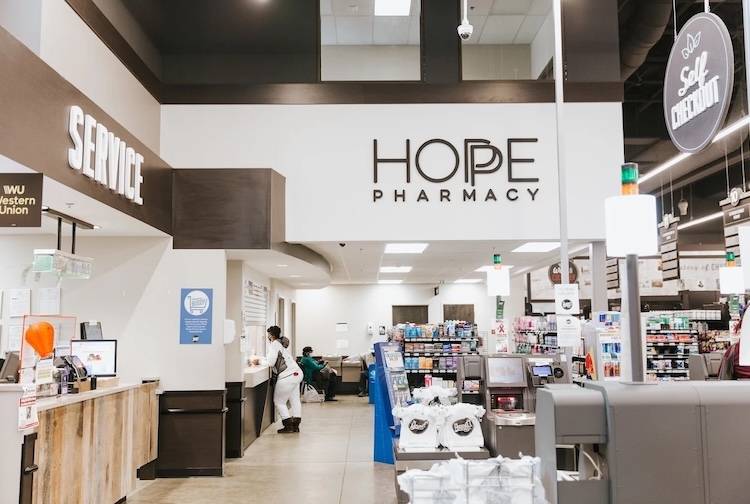Here is how VCU plays an unparalleled role in training Virginia’s health care workforce
The state’s top producer of health sciences graduates is treating the critical need for more providers.
November 21, 2025 Graduates from VCU’s health sciences programs sustain hospitals, clinics and communities across the state, and VCU is actively working toward meeting Virginia’s emerging health care workforce needs. (Allen Jones, Enterprise Marketing and Communications)
Graduates from VCU’s health sciences programs sustain hospitals, clinics and communities across the state, and VCU is actively working toward meeting Virginia’s emerging health care workforce needs. (Allen Jones, Enterprise Marketing and Communications)
By Olivia Trani
As Virginia faces a life-threatening challenge – the daunting shortage of health care professionals – Virginia Commonwealth University is confronting it head-on. At its comprehensive and renowned health sciences campus, VCU is training the next generation of caregivers, researchers and health leaders in numerous fields.
With 75 health-related degrees and certificate programs spanning six schools and colleges, VCU is the only university in Virginia – and one of the few across the nation – that educates students across every health science discipline. These graduates – more than 1,200 annually – sustain hospitals, clinics and communities across the state, making VCU an unparalleled leader in shaping Virginia’s health care future.
The numbers reveal the need
The statistics tell an alarming story: There are not enough health care professionals to meet the expanding needs of Virginians. Among the points of evidence:
- About 44% of Virginia’s neighborhoods lack adequate access to primary care services, affecting nearly 3.8 million residents.
- There are concerning shortages in nurses, behavioral health providers, dental hygienists and pharmacists, among other important health care roles, with rural areas often hit hardest.
- More than 100,000 health care workers are approaching retirement age within the next 10 years, according to statewide data, presenting a serious public health threat.
“The demand for more health care professionals continues to grow in Virginia, particularly with the rise in chronic health conditions that require more care and an aging population with complex health needs,” said Patricia Kinser, Ph.D., dean of the VCU School of Nursing. “In any given time in the commonwealth, there are a large number of unfilled positions, which strains health care accessibility for Virginians.”
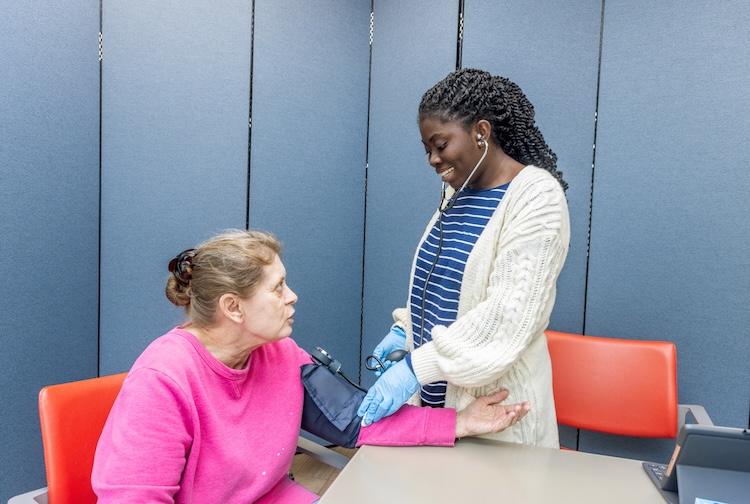 Students build strong connections with communities across Virginia and create a meaningful impact through various initiatives that address local health needs and promote wellness. (MCV Foundation)
Students build strong connections with communities across Virginia and create a meaningful impact through various initiatives that address local health needs and promote wellness. (MCV Foundation)
VCU’s large footprint in Virginia
VCU is uniquely positioned to address this challenge. In 2024, among all of Virginia’s public universities, VCU graduated the most students with health-related degrees. These programs offer students the opportunity to launch their careers in nursing, medicine, pharmacy, dentistry, public health and other health professions dedicated to improving the lives of Virginia’s residents.
VCU’s health sciences schools have tens of thousands of living alumni, many of whom are powering Virginia’s health care workforce today. An analysis of nearly 200,000 health care worker profiles in Virginia showed that VCU appears most often as a source of education, and their impact is wide-ranging. Based on alumni surveys and other data:
- More than 90% of all School of Nursing graduates work in Virginia.
- School of Dentistry graduates make up one-third of all dentists in the state.
- 5-35% of School of Medicine graduates stay in state for residency.
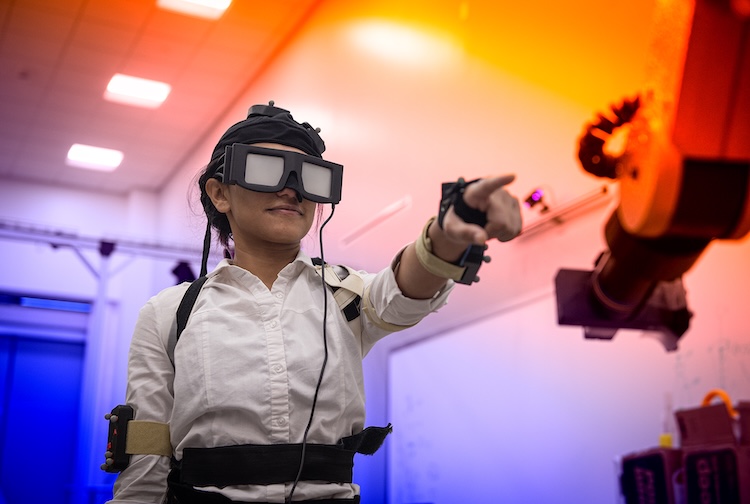 At VCU, students gain vital skills and expertise that allows them to confidently enter the workforce and become health care leaders. (Kevin Morley, Enterprise Marketing and Communications)
At VCU, students gain vital skills and expertise that allows them to confidently enter the workforce and become health care leaders. (Kevin Morley, Enterprise Marketing and Communications)
A national reputation, a nurturing focus
VCU’s health sciences campus has multiple programs ranking among the top 50 nationally by U.S. News & World Report, including rehabilitation counseling, nurse anesthesia, health care management, occupational therapy, physical therapy, nursing, pharmacy and biostatistics.
Here, students receive an unrivaled education that does more than prepare them to confidently enter the workforce: It positions them to be leaders in the fast-paced, ever-changing health care landscape. They learn from leading experts in their field, are involved in cutting-edge research on health and disease, and work in state-of-the-art facilities to ensure they develop the skills to provide excellent care.
Students also gain extensive hands-on experience through clinical placements at VCU Health, an internationally renowned health system, as well as at community health centers, rural community hospitals and specialized clinics across the state. Through these diverse health settings, students are exposed to a wider variety of experiences with patients, innovative therapies and leading-edge treatments, preparing them to serve communities anywhere and everywhere.
The variety of schools within VCU’s premier health sciences campus also means students learn in an interprofessional environment that reflects real-world health settings.
“Our students not only learn medical concepts and important aspects of the profession, but also how to interact with pharmacists, dentists, nurses and public health officials in an effort to truly understand what seamless care is for any one patient,” said Arturo Saavedra, M.D., Ph.D., dean of the VCU School of Medicine and executive vice president for medical affairs for the VCU Health System.
Turning practice into patient care
At VCU, students have an immediate impact on Virginia’s residents through their involvement with service-learning programs and at volunteer clinics that raise the collective health and wellness of communities.
This includes the Mobile Health and Wellness Program, Missions of Mercy, CrossOver Healthcare Ministry and the Diabetes Prevention Program. Through VCU’s longstanding partnerships with state health agencies, students also work with public health programs and develop community outreach initiatives that tackle Virginia’s most pressing health challenges.
“Through these volunteer efforts, our students, faculty and alumni come together to provide millions of dollars of care to Virginia’s communities,” said Lyndon Cooper, D.D.S., Ph.D., dean of the VCU School of Dentistry. “These experiences are also vital for preparing our students for entering the health care workforce. They gain critical exposure to treating different levels of disease and serving communities with limited access to health care, as well as learn important lessons in compassionate care and empathy.”
 VCU produces more graduates in health-related degrees than any other university in the state, making VCU an unparalleled leader in shaping Virginia’s health care future. (VCU School of Dentistry)
VCU produces more graduates in health-related degrees than any other university in the state, making VCU an unparalleled leader in shaping Virginia’s health care future. (VCU School of Dentistry)
How VCU is answering the call
Training the next generation of health care professionals comes with unique challenges. Health sciences degrees are 3.5 times more expensive on average than other degrees, according to VCU cost data, and this far exceeds what students in these programs pay in tuition. This is due to the need for specialized equipment and facilities, competitive salaries for well-qualified faculty, clinical placements and student-to-faculty ratio requirements from accrediting organizations.
But these investments ensure a healthier future for Virginians, and VCU’s health sciences schools are actively working to train more students in critically needed fields. Among the initiatives:
- Many of VCU’s health sciences schools are growing their capacity for training students. The School of Nursing has expanded enrollment to nearly double the number of students in its bachelor’s program, and it will continue to increase enrollment in its other programs in subsequent years. The School of Dentistry is looking to develop a new building that would allow it to increase class sizes.
- The schools also are helping students enter the health care workforce at a quicker rate, with offerings such as the accelerated B.S. and Pharm.D. program at the School of Pharmacy, accelerated master’s degrees in gerontology and medical laboratory sciences at the College of Health Professions, an accelerated master’s degree in public health at the School of Public Health and a competency-based graduation program for M.D. students at the School of Medicine.
- The schools are regularly expanding the variety of health-related degrees, concentrations, training programs and residencies to meet emerging health needs, with recent additions including the cardiac perfusion program, pharmacy technician training program, prosthodontics residency, and public health concentrations in health policy and health communication. They are also adding programs to address disparities in health care access, such as the School of Medicine’s family medicine residency program at VCU Health Community Memorial Hospital, which is targeting the needs of rural Virginians.
- And for existing health professionals, VCU is enhancing their skills as providers for Virginia’s communities. Through guaranteed admission pathways, continuing education opportunities and online alternatives for a number of programs, health care workers can advance their education without needing to take time away from their important roles.
“Our schools are laser-focused on bringing forward innovative strategies to solve Virginia’s most pressing health care workforce challenges,” said Marlon Levy, M.D., MBA, senior vice president for VCU Health Sciences and CEO of VCU Health. “As the state’s most comprehensive health sciences campus, and one of only 12 universities in the entire country to be able to offer this large complement of schools, such is our uncommon value and duty to our communities.”


